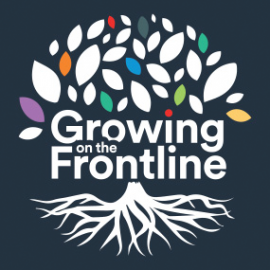Word for the Week
Short reflections on Bible passages, with a frontline focus...
Read
My son, if you accept my words
and store up my commands within you,
turning your ear to wisdom
and applying your heart to understanding –
[…]
Then you will understand what is right and just
and fair – every good path.
For wisdom will enter your heart,
and knowledge will be pleasant to your soul.
Discretion will protect you,
and understanding will guard you.
Proverbs 2:1—2, 9—11
In this series, we’re walking through the four simple steps used in Growing on the Frontline, our new group resource, to help us grow in maturity and fruitfulness. Last week we looked at reflecting on what’s happening around and within us. This week, we turn to receiving God’s wisdom from the Bible.
I can remember too many times in my working life when I’ve prioritised pressure over people. I’m the sort of person that likes to get things done, tick them off my list, and enjoy the affirmation that comes from others.
Nothing wrong with that, perhaps, unless it stops me noticing that the person I work next to is upset this morning, or needs my help with something I’ve asked them to do. And if I’m brutally honest, I probably do notice but then choose not to ‘go there’. Why do I do that?
Though we might know in theory what it looks like to be fruitful, we may not actually do it in the moment. We have to choose to live it out – but we’re not always conscious of the choices we make, good or bad. They often happen instinctively. And that’s because they’re driven by basic desires that we all share – for things like security, approval, or having a measure of control.
The problem comes when we try to fulfil those desires through other people rather than trusting in God. That’s when we stop really loving our neighbour – like when I prioritised a sense of approval over listening to my colleague.
But don’t worry. Help is at hand. As the author of Proverbs indicates, the Bible is shot through with God’s design for how to live. If we ‘turn our ears to wisdom’ and ‘apply our hearts to understanding’ then ‘wisdom will enter our hearts and understanding will guard us’.
Notice that we have an active part to play in this process. In order to ‘love God with all our heart, mind, soul, and strength and our neighbour as ourselves’ (Matthew 22:37–39), we need not just to read God’s word but deeply receive it. To let it soak into us and help us engage our whole selves – mind, emotions, soul, and body – in becoming wholly aligned to God’s wise ways.
Christians have been using a prayer tool called Lectio Divina to help them do this for centuries. Why not take a minute to try it out on this passage? Read the verses slowly, two or three times. What stands out to you? Spend some time prayerfully chewing it over. What would you like to say to God about it? Talk to God about what you have seen in these verses, and then sit quietly with him in silence for a minute and let it sink into your heart.
___
Charles Hippsley
Co-author of Growing on the Frontline
Join the conversation in the comments section below.

This is really good Charles – thank you.
Oh dear! Once again, the ‘either/or’ reductionist error at work. Part of God’s provision is ‘other people’ and their God-given resources for loving their neighbours as themselves.
It’s ‘both…and’ – God and all he provides which includes people, creation, etc etc.
With love and frustration,
Jean Watson